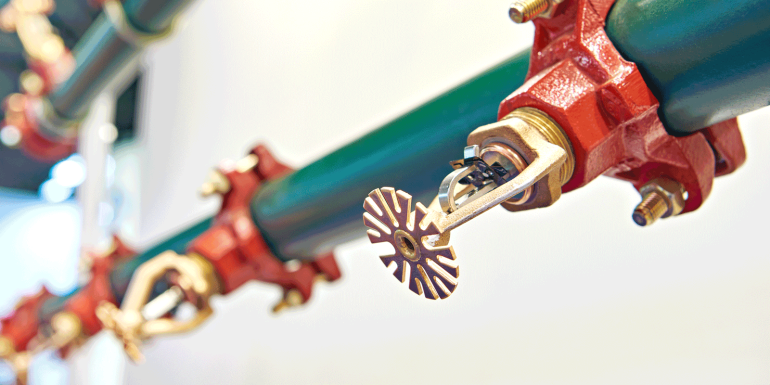BAFSA – celebrating 50 years of fire safety

Sprinklers have helped to save countless people’s lives over the last half century
but, as BAFSA chief executive Ali Perry tells us, it’s still not enough.
 This year, the British Automatic Fire Sprinkler Association (BAFSA) celebrates its 50th anniversary. To mark the occasion, a reception and lunch at the House of Lords last week was attended by key political and industry figures for the launch of a special video. Then, over the course of the coming year, BAFSA has scheduled a programme of activities designed to raise the profile of an organisation that has played a key role in protecting buildings – and lives – for half a century.
This year, the British Automatic Fire Sprinkler Association (BAFSA) celebrates its 50th anniversary. To mark the occasion, a reception and lunch at the House of Lords last week was attended by key political and industry figures for the launch of a special video. Then, over the course of the coming year, BAFSA has scheduled a programme of activities designed to raise the profile of an organisation that has played a key role in protecting buildings – and lives – for half a century.
For Ali Perry, the last week has also marked his own personal anniversary, having taken on the role of BAFSA chief executive last February.
"I retired from the Scottish Fire and Rescue Service on 31 January 2023 and I started with BAFSA the very next day," he says.
He ran the Prevention and Protection Department in the Scottish Fire and Rescue Service. That involved fire investigation, engineering, fire safety, and community safety and engagement across Scotland. "One of the things that we looked at was how fire deaths occurred and how we could reduce those. Throughout that work, sprinklers kept coming into my thoughts as the way forward, so it was an ideal opportunity to join BAFSA."
Safety effective
Ali’s background in the fire service, rather than industry, gives him a unique insight into the real-world impact of fires.
"I was in the fire service during the aftermath of two separate incidents where fire fighters were tragically killed. I have dedicated my working days to reducing fire deaths in the home, and reducing the impact of that on communities," he says.
"Sprinklers are shown to work on 94% of occasions and, when they work, 99% of the time they either extinguish or control a fire. But, each year, 350 lives are lost to fires in the home – the impact of that is massive."
Ali and BAFSA’s intention is to use this anniversary year to reinvigorate the call for wider use of sprinklers and correct some of the widespread myths about the technology.
"There’s this idea that when one sprinkler activates, they all activate. That is down to TV and movies like the famous scene in Die Hard. But that doesn’t happen. It’s only the sprinkler above the fire that bursts because it’s a mechanical response."
"Then there’s the belief that the water damage will be as significant as fire damage – that’s not true, it is significantly less. The water damage from sprinklers is certainly significantly less than the water damage caused when the fire service arrives.
"Because fire is relatively rare, people think it’s not going to happen to them. However, it does happen but we have the ability to stop it happening. If sprinklers become more common, the cost will go down, and once you make it an established part of construction, it’s then built into the fabric of the building."
Spreading the word
The notion that sprinklers could become a standard part of almost any construction project may seem unlikely in England, but other UK countries are following slightly different paths.
For example, in October 2013, the National Assembly for Wales passed regulations that require a fire sprinkler system to be installed in new and converted houses and flats. In Scotland, all new-build social homes, flats, and shared multi-occupied residential buildings have been required to be fitted with automatic fire suppression systems since March 2021.
"In Wales, there was great clamour from house builders saying this will never work, but it does work and it is happening," adds Ali.
"That development in Wales means it’s easier for us to put our case forward and any argument to say it’s impossible is invalid. It can work, it does work, it’s just not being done.
"People say: we’re not fitting sprinklers in all buildings. Well then, let’s start doing it in an iterative way and start chipping away by focusing on the highest risk buildings first, then gradually move towards a position that we are already seeing in Wales with sprinklers in domestic housing and workplaces."
In pursuit of that cause, BAFSA and CABE are developing ever-closer ties with, Ali says, CABE members at the heart of any attempts to widen the installation of sprinklers.
"We are working with CABE and actively discussing how we can raise understanding of sprinklers. From me, there’s a real plea to the members of CABE that we are here to help improve their understanding of sprinklers. We’re not here to be difficult, we understand the challenges around the issue, but we are here to support and enable CABE members when it comes to sprinkler systems and fire suppressant system."
For more information about sprinkler systems, read our in-depth in the upcoming Marchedition of Building Engineer.









